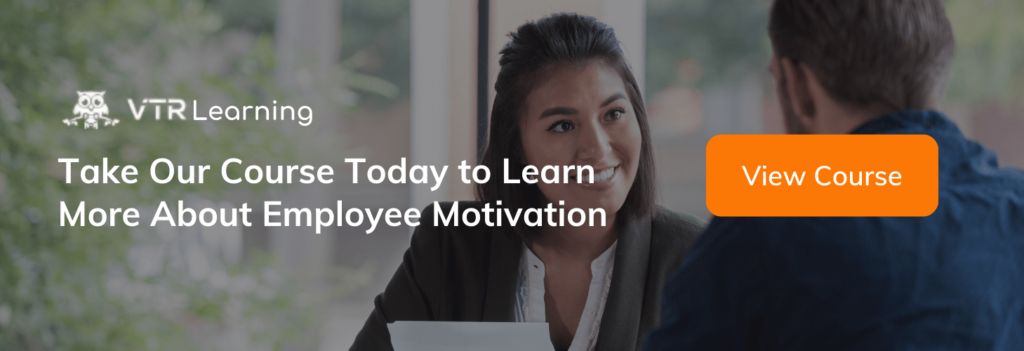![How to Deal with Mental Exhaustion at Work [10 Helpful Tips]](https://assets.vtrlearning.com/wp-uploads/2024/04/Suffering-from-Mental-Exhaustion.png)
Mental exhaustion isn’t a momentary thing but a pervasive state that negatively impacts both physical and mental health. And unfortunately, it’s not an uncommon occurrence. For example, the American Psychological Association reports the following statistics about burnout and mental exhaustion:
- 36% of workers reported cognitive weariness
- 32% noted emotional exhaustion
- 44% cited physical fatigue
Furthermore, other reputable health organizations describe that workers suffering from mental exhaustion could need up to three months to recover. So, ascending to this level of workplace burnout isn’t something you should scoff at.
Fortunately, despite the prevalence of job stressors, we can take action to prevent work burnout, including both mental and physical weariness. And while these methods are preventative, most workers could benefit from them, regardless of whether they’re approaching burnout.

Share this Image On Your Site
Helpful Ways to Prevent Mental Exhaustion
1. Get Adequate Sleep
One of the first things you need to do if you feel you’re approaching burnout is ensure you get enough rest. Sleep deprivation is often touted in our hyper-achievement culture as a sort of mark of a good worker. However, beyond the long-term physical impacts hypertension, stroke, and other major diseases, it poses immediate challenges. For example, irritability, lack of focus, memory loss, and even pain.
Of course, these risks all taken together easily drive individuals toward burnout much faster. And the fact that you can often prevent them with adequate amounts of sleep make them easily combatable. So, if you notice any of these symptoms, make sure to assess your sleep patterns.
On average, adults of working age need anywhere between seven and nine hours of sleep every night. And understandably, achieving that amount isn’t always possible. But doing everything you can to clear your schedule and set aside enough time for physical rest is vital to every part of your life.
2. Begin Clearing Your Schedule
Overcommitting to various activities and responsibilities often plays a large part in mental exhaustion. And on a personal note, this is something I’m all too familiar with. For example, my commitments include:
- Parenting
- Work
- Various religious activities
- Helping lead Scouts for my son’s group
- Photography
- Household chores
And while these activities sometimes overwhelm me, I’m willing to bet many other individuals have far more on their plate. Eventually, these full schedules start to conflict internally, and push valuable rest time to the wayside.
So, if you begin noticing different symptoms of exhaustion, do whatever you can to rearrange your schedule and ensure time to relax. Sometimes, it might mean dropping certain commitments. Alternatively, you might only need to space out the instances of certain activities. For example, commit to them twice a month instead of every week.
Exactly how you accomplish this will look different than the way another person does, but that’s the point. You need to do what works best for you. Some people work well with a packed schedule and flourish. But others need to take more time to recuperate. Ultimately, find a good middle ground where you have enough free time without sacrificing all your responsibilities.
3. Take Breaks
Even amidst your busy schedule, you need to find appropriate and regular time for breaks. And that includes the time you spend at work. Whether you’re in an office, a job site, or working from home, set aside a few minutes to step back and clear your mind
You might want to spend this time to get up and move around. After all, getting your blood pumping helps wake you up and allows you to think more effectively. Alternatively, you might spend this time simply clearing your mind – meditating. That can be helpful whenever different tasks start to pile up and become overwhelming. That way, when you come back a few moments later, you can more clearly understand how to tackle your work.
Of course, you also have to be careful not to let this transform into avoidance. Because if you start using breaks to keep from having to face the work you need to accomplish, that can start to pile up and have the opposite impact. And this could lead you further into mental exhaustion. So, as with most things, find a good middle ground, where you know how to responsibly step back for a moment without letting it become excessive.
4. Exercise Regularly
Interestingly, the habits we build outside the workplace have as large an impact for our careers as they do outside. For example, regular exercise helps motivate us both in our personal lives and in our jobs. Interestingly, daily activity wards off the negative effects of restlessness, reducing anxiety, depression, and other mental disorders.
The Department of Health recommends that adults need at least 2.5 hours of moderately-intense activity each week. That ends up equaling less than one percent of your time. So, while it might initially seem like a large commitment, rearranging even only slightly can help make this possible.
Furthermore, you don’t have to immediately jump into a gym membership or some other expensive obligation. Instead, something as simple as taking a brisk walk around your neighborhood can help immensely. Not only does it help you start to become more active, it also puts you outdoors, which helps reduce stress and feelings of anger. So, if you find yourself struggling to make daily exercise a part of your life, start by going for short walks and build up from there.
5. Spend Time Organizing Your Space
Sometimes, it’s difficult to tell the difference between an organized mess and a disaster area, but finding that line matters. A cluttered workspace elevate stress and impact our ability to focus on necessary tasks. However, what appears “messy” to some might be perfectly functional to another. So, the decision to better organize your space is intensely personal.
One way to gauge whether you need to focus more attention on cleaning up your area is asking whether you spend time finding things you need. If so, then your work materials don’t have a space they belong, and you should consider better organization. On the other hand, if you have a cluttered desk but know exactly where everything is, you might be fine to leave it the same.
Ultimately, it’s difficult to say from the outside whether you should clean up your space. However, at the very least, we can propose that you take it into consideration. Sometimes, doing so can help you maintain focus, feel more motivated and able to get your work done. That way, you don’t run into burnout and mental exhaustion.
6. Formulate a Constructive Work Plan
Similarly to the paralysis that comes from overcommitting to different activities, overwhelming work tasks can lead to immobility and exhaustion. In other words, if you have no plan of attack, you might not get anything accomplished.
So, if you’re feeling like you can’t figure out where to start with work, don’t just try to dive. Instead, take the time to formulate a plan that takes you through everything you need to accomplish. That way, you know exactly what steps to take to ensure you succeed. Otherwise, you’ll likely find yourself floundering from one task to the next with no idea how everything fits together.
Sometimes, it helps most to do this on a daily basis – let each work period worry about itself. At the start of your day, note the things you need to do in that day only. Then, set out to tackle them one by one. On the other hand, there are times that having an overarching, long-term idea works better. Especially if your job tasks directly impact others on the same team. In those cases, you might plan out the things you need to accomplish over weeks or months, then set out breaking them down into smaller, manageable components.
Regardless how you do it, coming up with a plan of steps to take you through your work can help alleviate the stress that comes with trying to do things haphazardly. So, consider that planning how to do the work is just as important as actually doing the work.

7. Never Be Afraid to Ask for Help
Now, this tip is a little more amorphous than it might seem at first. Do we mean help at work, or help from a professional? Or perhaps help from family and friends?
Yes, we do – all of the above.
The stress of work doesn’t stay in neatly compartmented boxes. What exhausts you mentally at work will doggedly follow you home, and it impacts your personal life as much as your professional standing. So, if you know you’re approaching a place of burnout, don’t be afraid to start talking about it.
Of course, there are bosses and coworkers out there who, unfortunately, don’t care. They simply want to see the work done (your feelings be damned). But in this age of instant information access, most people are hyperaware that they have to have irreproachable conduct.
That being the case, many managers won’t be quite as quick to dismiss your mental health. Besides, bringing up your struggles with them presents an opportunity to prevent a worse situation from happening.
Moreover, allowing your partner, friends and other important figures to help shoulder the burden of your exhaustion can help as well. Naturally, you don’t want to take advantage of others. But if you can’t rely on them during difficult times, you might wonder whether they have your best in mind.
All in all, no matter the outcome, don’t be afraid to start talking about your mental state – you can always ask for help.
8. Keep a Journal
If we begin thinking the different thoughts swirling around in our heads have nothing to do with mental exhaustion, we’ve already started out on a losing battle. Understanding the complex relationship between your different feelings and ideas is often a helpful step toward an eventual resolution. And one great way to begin unraveling the different threads is by keeping a journal.
This allows you the opportunity to pull your worries, fears, accomplishments, successes, and other feelings from your head and put them to paper. Then, you can start sorting them out.
Furthermore, in keeping a journal, you always have clearer hindsight, because you can look back and see how far you’ve come. On the other hand, if you find yourself in a difficult position and begin thinking lowly of yourself, you can look back and view your successes.
In a nutshell, keeping a journal is a great way to continually motivate yourself while also allowing the opportunity to work through your emotions.
9. Meet Your Basic Needs
Maslow’s Hierarchy of Needs theory describes the idea that we can’t move on to higher orders of achievements until our basic needs are met. And at the very bottom of the pyramid, we find physiological necessities such as food, water, and shelter. So, if you fail to meet these basic needs, you’ll have a much more difficult, if not impossible, time trying to fulfill others.
In short, avoiding mental exhaustion requires plenty of energy. And for that, you need adequate sleep, healthy food, plenty of water, and reliable shelter. If you lack these, then you need to start by addressing these areas as best you can. Otherwise, you’ll likely already be in a state of burnout and exhaustion before you recognize it.
10. Find Something to Enjoy
One of the largest causes of mental exhaustion is the idea that we must constantly work. While your career is an indispensably important aspect of your life, it shouldn’t make up the whole of your being. Because if you find your entire identity in your job, you’ve built your foundation on very unstable sand.
Instead, you should find something outside the workplace to enjoy, whether it’s a hobby, time with family, spiritual practices, or some other fulfilling activity. That way, you have something specific that, at least for a few moments, takes you away from the stresses of work.
The ability to push worry and anxiety out of your mind and leave it at the door of the office is paramount to a healthy work life balance. And if you have something you enjoy pursuing with no ties to your job, it makes it that much easier.
So, find something, no matter how small or seemingly insignificant, that makes you happy and chase after it. That way, even if you do reach a place of burnout, you have at least one bright star.

Learn More About Motivation and Mental Exhaustion
We’ve only scratched the surface of this vast and complex topic, but hopefully you understand how important it is to combat mental exhaustion. Even if you’re already exhausted, there are healthy ways to start burnout recovery. If you want to know more, then consider taking our course on Motivation and Behavior. It looks at similar concepts from an HR standpoint, with discussions on employee needs and health.
Last Updated:



![Improve Your Financial Literacy and Make Better Decisions [10 Tips]](https://assets.vtrlearning.com/wp-uploads/2023/09/Financial-Literacy-for-Personal-and-Professional-Success.png)

